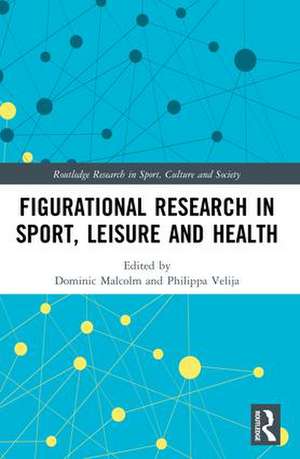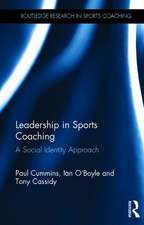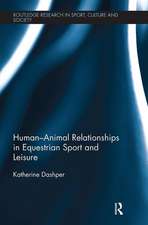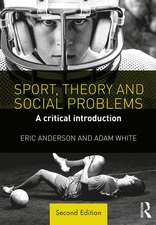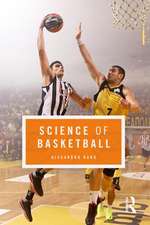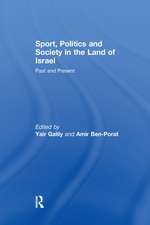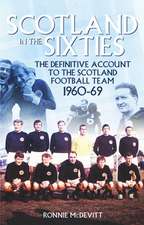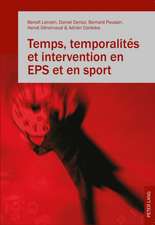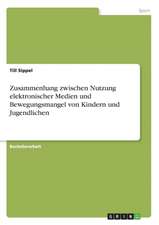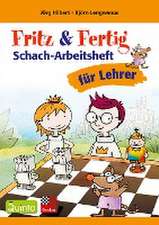Figurational Research in Sport, Leisure and Health: Routledge Research in Sport, Culture and Society
Editat de Dominic Malcolm, Philippa Velijaen Limba Engleză Hardback – 14 aug 2018
This book brings together an international team of scholars working within the figurational tradition to explain the significance of figurational sociology in the development of the sociology of sport and to provide empirical case studies of figurational sociology in action. Covering core concepts such as the civilizing process, and key methods such as interviewing and ethnography, the book presents contemporary research in areas as diverse as sport-related health, mixed martial arts, sports policy, gender relations and cycling.
Figurational Research in Sport, Leisure and Health is an important resource for students of sport and social sciences, sociology, figurational sociology and sociology of sport and exercise.
| Toate formatele și edițiile | Preț | Express |
|---|---|---|
| Paperback (1) | 259.98 lei 6-8 săpt. | |
| Taylor & Francis – 30 iun 2020 | 259.98 lei 6-8 săpt. | |
| Hardback (1) | 763.62 lei 6-8 săpt. | |
| Taylor & Francis – 14 aug 2018 | 763.62 lei 6-8 săpt. |
Din seria Routledge Research in Sport, Culture and Society
-
 Preț: 327.30 lei
Preț: 327.30 lei - 9%
 Preț: 1037.38 lei
Preț: 1037.38 lei - 8%
 Preț: 381.69 lei
Preț: 381.69 lei -
 Preț: 324.82 lei
Preț: 324.82 lei -
 Preț: 309.74 lei
Preț: 309.74 lei -
 Preț: 341.55 lei
Preț: 341.55 lei -
 Preț: 203.03 lei
Preț: 203.03 lei -
 Preț: 311.07 lei
Preț: 311.07 lei -
 Preț: 356.63 lei
Preț: 356.63 lei -
 Preț: 356.63 lei
Preț: 356.63 lei -
 Preț: 325.34 lei
Preț: 325.34 lei -
 Preț: 324.82 lei
Preț: 324.82 lei -
 Preț: 341.55 lei
Preț: 341.55 lei -
 Preț: 218.99 lei
Preț: 218.99 lei - 17%
 Preț: 270.66 lei
Preț: 270.66 lei -
 Preț: 491.21 lei
Preț: 491.21 lei - 18%
 Preț: 1060.52 lei
Preț: 1060.52 lei - 18%
 Preț: 1119.52 lei
Preț: 1119.52 lei - 18%
 Preț: 1064.70 lei
Preț: 1064.70 lei -
 Preț: 488.29 lei
Preț: 488.29 lei - 18%
 Preț: 1059.48 lei
Preț: 1059.48 lei - 18%
 Preț: 1110.74 lei
Preț: 1110.74 lei - 18%
 Preț: 1109.99 lei
Preț: 1109.99 lei - 18%
 Preț: 1059.14 lei
Preț: 1059.14 lei - 18%
 Preț: 1108.42 lei
Preț: 1108.42 lei - 18%
 Preț: 1120.20 lei
Preț: 1120.20 lei - 18%
 Preț: 1058.79 lei
Preț: 1058.79 lei - 18%
 Preț: 1064.36 lei
Preț: 1064.36 lei - 18%
 Preț: 1060.87 lei
Preț: 1060.87 lei -
 Preț: 486.38 lei
Preț: 486.38 lei - 18%
 Preț: 1050.78 lei
Preț: 1050.78 lei - 18%
 Preț: 1112.90 lei
Preț: 1112.90 lei - 18%
 Preț: 1112.34 lei
Preț: 1112.34 lei - 18%
 Preț: 1060.87 lei
Preț: 1060.87 lei - 26%
 Preț: 818.95 lei
Preț: 818.95 lei - 18%
 Preț: 1116.38 lei
Preț: 1116.38 lei - 18%
 Preț: 1112.17 lei
Preț: 1112.17 lei - 18%
 Preț: 1106.02 lei
Preț: 1106.02 lei - 18%
 Preț: 1058.79 lei
Preț: 1058.79 lei - 18%
 Preț: 1058.10 lei
Preț: 1058.10 lei - 18%
 Preț: 1057.09 lei
Preț: 1057.09 lei - 26%
 Preț: 846.92 lei
Preț: 846.92 lei - 18%
 Preț: 1061.06 lei
Preț: 1061.06 lei - 18%
 Preț: 1058.43 lei
Preț: 1058.43 lei
Preț: 763.62 lei
Preț vechi: 1027.07 lei
-26% Nou
Puncte Express: 1145
Preț estimativ în valută:
146.13€ • 151.70$ • 121.85£
146.13€ • 151.70$ • 121.85£
Carte tipărită la comandă
Livrare economică 22 martie-05 aprilie
Preluare comenzi: 021 569.72.76
Specificații
ISBN-13: 9781138708259
ISBN-10: 1138708259
Pagini: 196
Dimensiuni: 156 x 234 x 11 mm
Greutate: 0.42 kg
Ediția:1
Editura: Taylor & Francis
Colecția Routledge
Seria Routledge Research in Sport, Culture and Society
Locul publicării:Oxford, United Kingdom
ISBN-10: 1138708259
Pagini: 196
Dimensiuni: 156 x 234 x 11 mm
Greutate: 0.42 kg
Ediția:1
Editura: Taylor & Francis
Colecția Routledge
Seria Routledge Research in Sport, Culture and Society
Locul publicării:Oxford, United Kingdom
Public țintă
Postgraduate and UndergraduateCuprins
1. Introduction to Figurational Research in Sport, Leisure and Health, Part I: Key Concepts, 2. The Development of Modern Sport: Sportization and Civilizing Processes, 3. Game Models as a framework for understanding power in the Male Football Figuration, 4. ‘Football Fitness’: A quest for excitement or a leisure routinization?, 5. The Theory of Established-Outsider Relations: Understanding Gender Relations in the Cricket Figuration, 6. The Development of Mixed Martial Arts: Using the Quest for Excitement and Informalization to Understand Sportization, Part II: The Research Process, 7. Doing Developmental Research as a Figurational Sociologist: A Case Study on the Long-term Sportization of Swimming, 8. On (Not) Becoming: Involved–Detachment and Sports ‘Violence’, 9. Doing (Figurational) Research: Using Semi-Structured Interviews in the Field of Public Health, Part III: Synthesis and Development, 10. Figurational Research and Doping in Professional Cycling, 11. A figurational understanding of sport organizations: the case of the Gaelic Athletic Association in Ireland, 12. Sport Policy, Sports Development and Figurational Sociology, 13. Figurational Sociological Approaches to Sport, Exercise and Health
Notă biografică
Dominic Malcolm is Reader in the Sociology of Sport at Loughborough University, UK, and Editor of International Review for Sociology of Sport. His core research interests draw on and apply the theoretical ideas of Norbert Elias’s figurational sociology to two substantive areas: the social development of cricket; and sport, health and medicine.
Philippa Velija is Head of Sport Education and Development and Senior Lecturer in Sociology of Sport at Solent University, UK. Her research focuses on a sociological analysis of women’s experiences in a range of male-dominated sports, for example cricket, flat and jump jockeys and the martial arts. She has also published on gender and sport policy and women and leadership in sport governance.
Philippa Velija is Head of Sport Education and Development and Senior Lecturer in Sociology of Sport at Solent University, UK. Her research focuses on a sociological analysis of women’s experiences in a range of male-dominated sports, for example cricket, flat and jump jockeys and the martial arts. She has also published on gender and sport policy and women and leadership in sport governance.
Descriere
Figurational Research in Sport, Leisure and Health brings together an international team of scholars working within the figurational tradition to explain the significance of figurational sociology for the study of sport. It covers core concepts, such as the civilizing process, and key methods, such as interviewing and ethnography.
